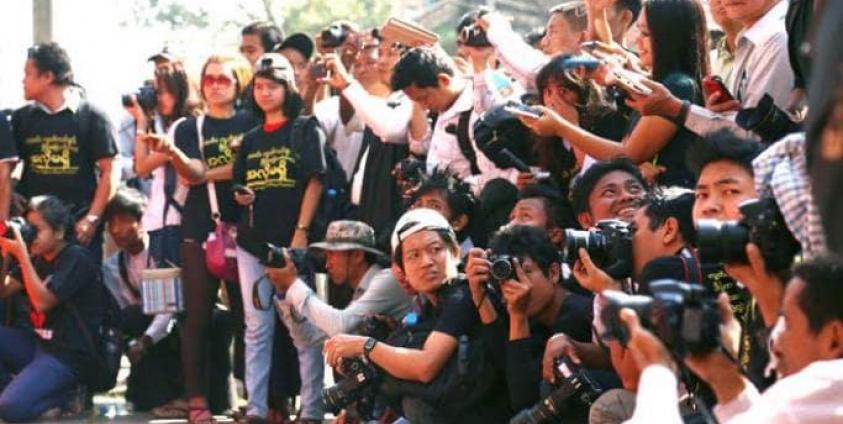The threat of jail and the problems of poor pay are not enough to stop Htet Paing (a pseudonym) from chasing his calling.
Htet Paing is a citizen or freelance journalist in the Bago Region who reports for local news agencies and has been working for about two years. Htet Paing is not a permanent columnist for any agency. He makes his living from freelance reporting.
Even in the time of the previous civilian government, his job was not as easy as permanent journalists working for news media outlets, Htet Paing said. This is partly because he does not own a press ID card to identify himself as a reporter. As he notes, achieving the trust of the sources who will tell their stories to the public is vital.
From having some 50 percent freedom of the press during the time of the civilian government, now it is close to having zero after the military coup. This is difficult for freelance journalists like Htet Paing, who notes that during the demonstrations it was hard for journalists to get their hands on protective gear to use while they report.
When journalists were arrested and targeted as the momentum of the anti-junta revolution grew, Htet Paing had to consider if he should continue his job. However, he kept on working as a journalist because it was both his hobby and his living.
“Since 2015, I have written special news about our township on Facebook pages and in Facebook groups. I like writing news. I wanted to write professionally. Later, I could work as a freelance local journalist for a news agency,” he said.
The wage of freelance reporters is not steady. Depending on the length, a story can make around 20,000 Kyat (about US$12). Htet Paing says he makes roughly 200,000 Kyat (about US$120) monthly.
For a journalist who has to put his life on the line at work, Htet Paing is also facing the difficulty of not earning enough from being a freelance reporter. Because he is not a staff reporter, his status is insecure. And, due to the current circumstances, he has to work secretly in the country.
In the wake of the February 2021 coup, journalists have been targeted by the junta. On 8 March last year, the Military Council revoked the media licenses of news agencies such as Mizzima, DVB, 7Day, Myanmar Now, and Khit Thit. On 2 May, the Myitkyina journal in Kachin State was also banned from publishing. After revoking the licenses of the news agencies, the military junta started arresting their journalists.
Htet Paing, working on the run, was arrested two months after the coup. He said he was beaten and interrogated by the military in an interrogation centre. Soon after the arrest he was charged with Section 505 (A) and given a three-year prison sentence for allegedly selling news to a news outlet.
He served six months before being released under an amnesty. After being released he took a short break for health reasons and then escaped to a safe place from where he is continuing his journalism work. However, because of security issues, he cannot produce many stories and his monthly earnings have dropped. To make a living, he also has to do other jobs as well now, explained Htet Paing.
After the coup, the military tried many ways to control the media. Nine private media outlets had their licenses rescinded, but there have been no such problems for government-controlled media.
Htet Paing continues with his calling, despite the dangers and the limited pay. He is one of many citizen journalists in Myanmar attempting to tell the story of their country in crisis.







